The holiday season, a time often filled with joy and togetherness, can also amplify feelings of sadness and loss. Especially those who are coping with holiday grief.
The expectation to be cheerful can clash with the heavy reality of missing a loved one. Turning what is supposed to be a festive time into a painful reminder of absence.
This article explores how real people coped with grief during the holidays. They offer some advice for safeguarding your mental health during the holidays.
You will find ways to create new traditions and discover the balance between honoring your loss and embracing joy.
Why Is Grief Hard During the Holidays?
Grief can be particularly challenging during the holidays because it magnifies what’s missing. The emphasis on family gatherings, traditions, and creating memories can make the absence of a loved one even more profound.

The pressure to maintain a holiday spirit while navigating a grieving process adds a layer of complexity.
These individual stories of holiday grief might help you understand why grief is hard during the holiday season and how to cope.
Coping with the First Holiday Season After a Loss of Beloved Family Members
For many, the first holiday season after losing a family member is the hardest. There is no right or wrong way to navigate this period; going at your own pace is crucial.
Grieving during the holidays doesn’t follow a set timeline, and it’s okay to experience moments of joy amidst the sadness. It also is often not the only hardship we experience.
Maxime’s Loss of His Grandma and Financial Struggle
Some time back, I went through a holiday period characterized by loss and financial difficulties at the same time.
My grandmother passed away suddenly. Dealing with the sorrow was a challenge for me. To cope with the sadness during that time, I tried to create some traditions as a tribute to her.
I prepared her dishes, cuddled up to her preferred tunes, and reminisced about her with family members. This brought me solace when I needed it the most.
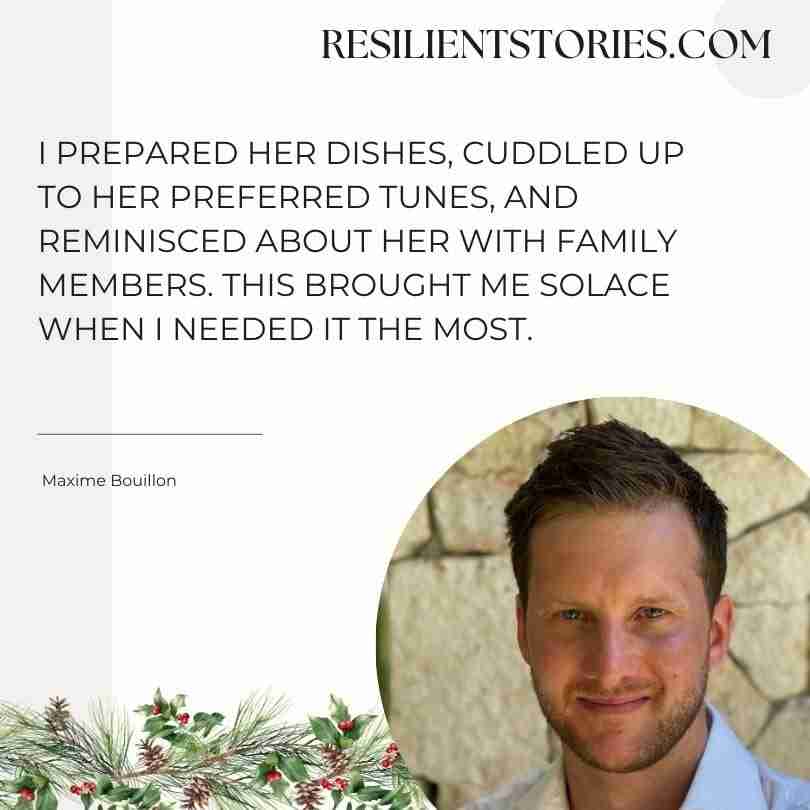
During that period; I encountered challenges as I strived to maintain the cheer, within my family circle. I transitioned to crafting gifts and creating memorable moments that were both economical and sincere.
This approach made me comprehend that the essence of the holiday season lies not in material possessions. Rather, it is in cherishing moments with those who matter to us.
The holiday period turned into a time for introspection and self-improvement for me. I came to appreciate the moments and found my strength amidst challenges.
Maxime Bouillon, Co-founder & CEO at Archie
Holding Onto Traditions Amidst Loss: Andi’s Story
After the loss of her husband, Andi faced a challenging holiday season, one that was emotionally complex for both her and her children.
This story illustrates that it’s okay to not feel 100% ready to celebrate, even when trying to create a sense of normalcy for others. Andi’s decision to focus on work and plan for future celebrations shows the importance of pacing oneself during the grieving process.
I lost my husband whose favorite time of year was Christmas. That year was hard for not only myself but my children.
I tried to continue with some of the traditions that we had established in our years together, but the challenges were real. He died Sept 1, 2015. He was recently medically retired after 27 years from the Air Force.
Some family members on my husband’s side didn’t handle his death well, so there was a lot of drama that I tried to stay away from.
I had bought some gifts for people in the family that were part of a great divide. Then, I did the best I could decorating, but it wasn’t normal or great by any measure. I gave gifts, but just couldn’t wrap anything that year.
I had our family’s traditional Christmas Eve-themed dinner, but it was simpler than in previous years. We had other traditions, like doing a destination Christmas every 3-4 years, so that didn’t get derailed by the first year after he passed.
The spending was a lot different that year. The emotions were all over the place, and I really just wanted to make it as great and normal for all, but couldn’t put myself 100% out there.
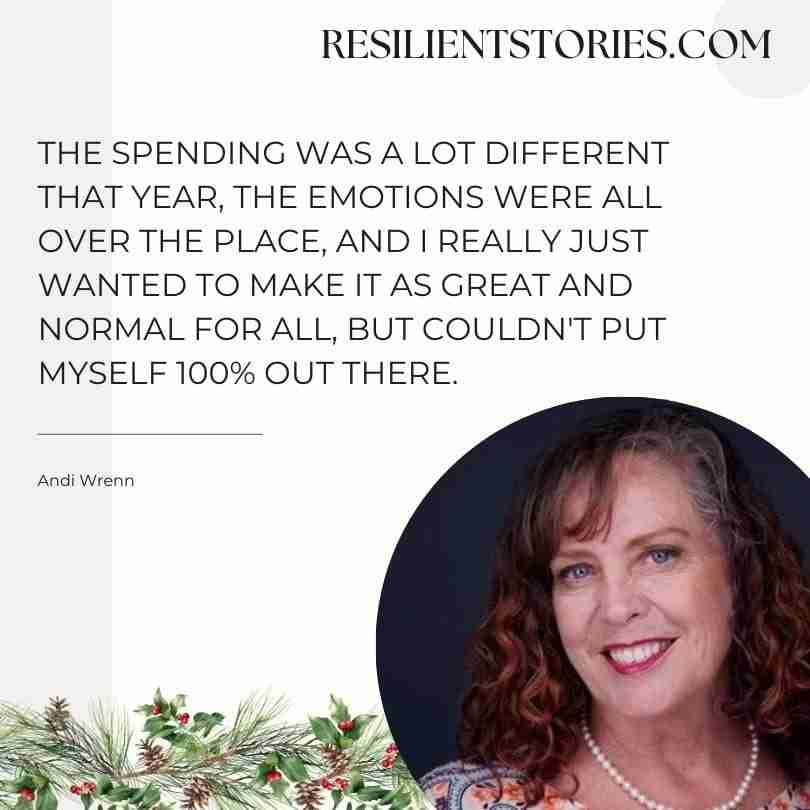
I didn’t take any time off from work for the first 9 months after he passed away. I dug into working and saving for future years when I could feel like celebrating.
Andi Wrenn, MA, AFC
Finding Peace From Holiday Grief Through Self-Care: Heidi’s Story
The holiday season, once a time of joy, became a season of sorrow and emotional turbulence for Heidi.
It’s a reminder that self-compassion and mindfulness are vital tools in navigating the emotional complexities of holiday grief, allowing space for both sorrow and healing.
Seven years ago, I faced one of the hardest holiday seasons of my life. My mother, battling bone cancer, passed away on December 14, just six days after my birthday.
In the months leading up to it, I had been living with my parents out of state and caring for her. The grief of her imminent loss was overwhelming.
Every day felt like an emotional rollercoaster, and even though we all hoped she’d make it to my birthday, the aftermath of her passing left me feeling hollow, struggling to find my footing during what was supposed to be a season of joy.
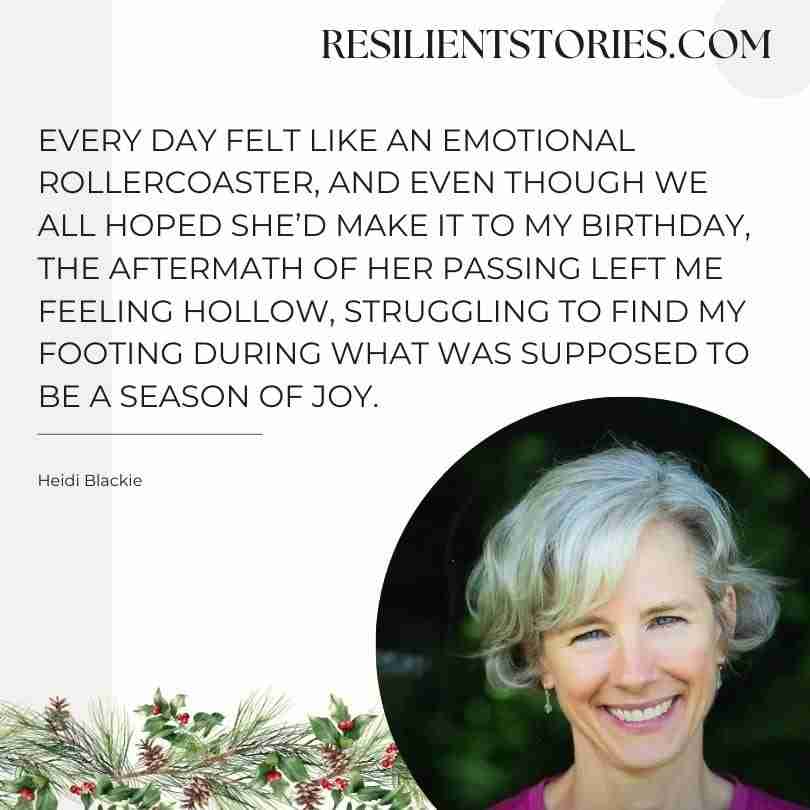
The holidays also carry the weight of my sister’s suicide the year before. With her birthday falling in November, the entire season became a painful reminder of loss. But over the years, I’ve developed some strategies to help me navigate this emotional landscape.
Foremost, I prioritize taking time for myself—whether through nature walks, movement, breathwork, or simply sitting in silence—so I have the space to process the heaviness.
EFT tapping has been a lifeline, helping me release grief and energy that feels too big to hold—I even created a modified version for when overwhelming emotions strike, giving me an accessible tool to lean on anytime.
When it comes to family gatherings, I’ve found that visualization is key. Before traveling or meeting with loved ones, I picture how I want our time together to feel and visualize how I want to show up.
This helps me stay grounded, reminding me that I always have a choice in how I respond to others. When I align my actions with my intentions, things go smoothly. And when they haven’t, I’ve learned to offer myself compassion instead of criticism.
The holidays are never easy for me, but by focusing on grounding, self-care, and visualization, I’ve created moments of peace amidst the chaos. For anyone going through something similar, these practices can help you carve out space for healing, even in the most challenging times.
Heidi Blackie, MOT/L, CHT, CSCS
Creating New Traditions to Honor Loved Ones
Some families find comfort in continuing old traditions, while others choose to establish new ones that honor the memory of their loved ones.
Cindy Eastman, who lost her daughter, Annie, shares how the weight of expectations during the holiday season made her rethink her approach.
When I wrote my book about being a caregiver for my dad, one of the chapters was about how I didn’t send out Christmas cards one year.
It went on to lament that another thing I did that year was to realize I had booked a New Year’s getaway with my husband to begin on the same day as my next semester of writing classes.
Once I got past the sheer embarrassment of having to email the director to reschedule, I realized that I also felt affirmed. How could I feel affirmed when I would typically be kicking myself for being such an idiot?
Somehow, the enormity of the mistake combined with the fact that I chose to go on the getaway instead of trying to convince my husband to postpone (which I typically would have done) brought with it a clarity of priorities.
Not only did we need time away together, but I needed time to continue to process what our life had become after the loss of my mother, which is how my dad ended up with us.
And I needed a little break from Dad, too.
Other times of the year demand our attention, but at the holidays, the harsh spotlight of expectation is disguised as colored bulbs ringing the front door or a sparkly star on the tree.
The pressure to perform amidst the surging currents of mourning is great. Grief takes up time and energy; it’s not always immobilizing, but it always requires your attention.
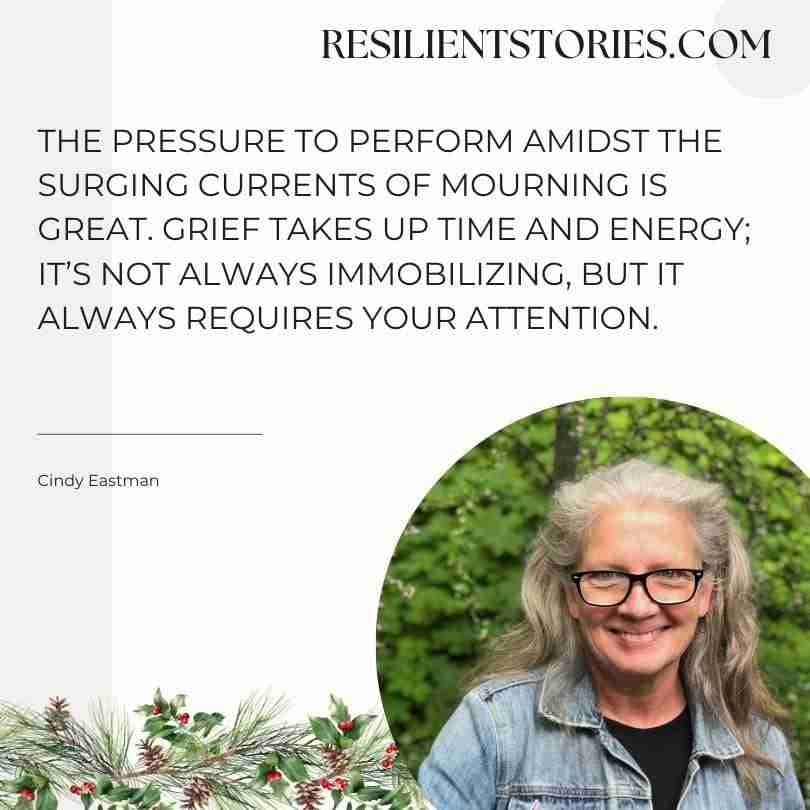
We Learn Life Lessons When We Need Them
It’s a good thing I received this lesson when I did because this year is going to be harder. This year we head into the holidays without my daughter Annie, who died from breast cancer at only 43 years old in April.
And, for me, it’s not just Christmas, because she and her husband and son traditionally spent Christmas with his family in New York. But we spent all the rest of the fall holidays here, together, in Connecticut.
Fall was her favorite time of year and she would have her decorations out by Labor Day. She and her little family would get their Christmas card pictures taken at a local orchard amidst the pumpkin patch or apple picking.
And, as much as Annie loved Thanksgiving, she always went out to pick out their Christmas tree the day after.
Having been through many losses over the last few years, navigating the holidays is different every year.
There isn’t any way for me to see into the future—a future I already know I don’t like—and know how I will be able to handle what feels like a wave of emotion headed my way.
But here’s what I do know: because I’ve had some practice, I can go easier on myself when I don’t want to join in all the reindeer games and pressures of the holidays. I might get out some of my Christmas decorations. Or I might not.
It’s really okay. Maybe I’ll bake some shortbread, maybe I’ll just pick up a box of those tasty Scottish ones at the grocery store. Cookies solved. What I mostly want to do is be open to what’s happening for me and my family around me.
The gift of being open to the lessons of loss and what we can learn about ourselves is a more honest way to honor who I am as a person and a perfect gift to give ourselves this Christmas.
There again may not be any Santa-stamped, cheery green envelopes bearing seasonal greetings dispatched from my address this year.
But I’m okay with it.
Cindy Eastman, Author, True Confessions of an Ambivalent Caregiver
Honoring a Lost Son: Laura Broome’s Journey Through Holiday Grief
For Laura Broome, the holidays are a bittersweet mix of joy and sorrow. As a mother who lost her oldest teenage son, Grigory, to suicide, the festive season carries a weight that many cannot imagine.
We adopted Grigory when he was nine years old. Our biological son was three months younger. Our family of four felt complete, and we became very close-knit.
The ten years we spent together before Grigory died of suicide included many happy memories. We did not know what was going on in his life the few months before he passed. We may never know. Instead, we choose to focus on what we do know.
The happy times we spent together as a family and Grigory’s achievements: acclimating to a new country, a new language, a new family (he lived in the orphanage since he was three years old), taking apart computers and building better ones, becoming an Eagle Scout, and enrolling in the U.S. Army National Guard.
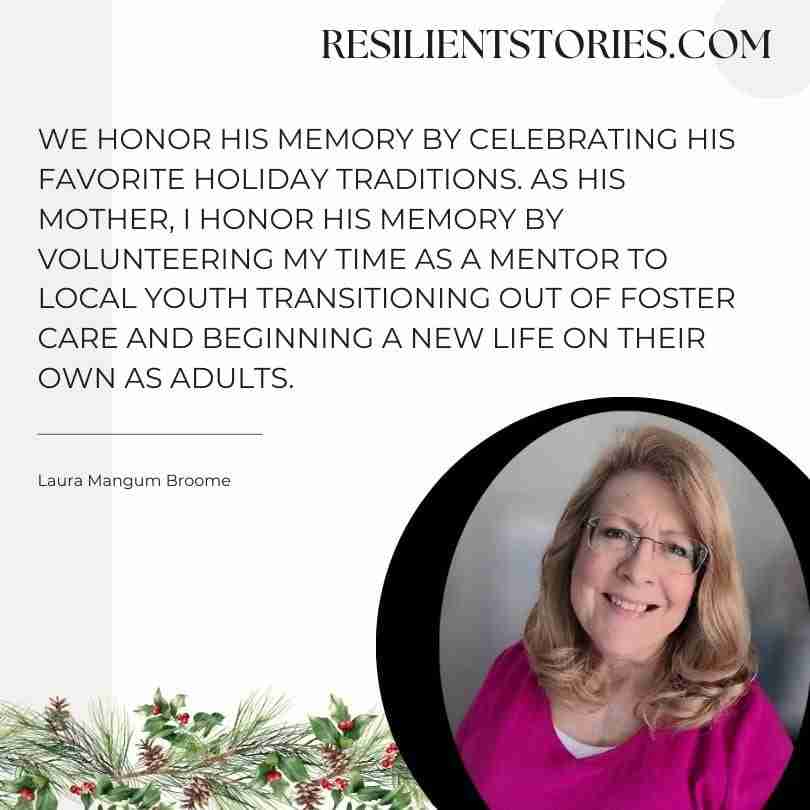
We honor his memory by celebrating his favorite holiday traditions. As his mother, I honor his memory by volunteering my time as a mentor to local youth transitioning out of foster care and beginning a new life on their own as adults.
Laura Mangum Broome, Founder and CEO, iCope2Hope LLC
Five Ways to Practice New Traditions and Cope With Holiday Grief
Laura, who is a resilience coach, also offers us some tips and things we can do to help find gratitude in these tough moments.
The practice of gratitude during the holiday season can be a powerful tool for those grieving. It allows you to shift your focus from what you have lost to what you still have and what you once had.
Remembering the positive times with your deceased loved ones can be a source of comfort and joy. Gratitude doesn’t negate the pain of loss, but it helps in balancing your emotions by acknowledging the blessings alongside the sadness.
1. Light a Memory Candle: Start a tradition of lighting a special candle in honor of your loved one. Choose a specific time during winter holidays to light the candle, perhaps during dinner or while opening gifts. This can be a moment of reflection and a symbol of the light your loved one brought into your life.
2. Create a Memory Tree: Dedicate a small holiday tree or a section of your main tree to your loved one. Decorate it with ornaments that represent their interests, favorite colors, or memorable moments shared with them. Invite family members to contribute, making this a collective act of remembrance and love.
3. Cook Their Favorite Dish: Incorporate your loved one’s favorite dish into your holiday meal. As you prepare and eat this dish, share stories about past holidays and cherished moments. This practice not only honors their memory but also keeps their presence alive in family gatherings.
4. Volunteer in Their Honor: Engage in an act of kindness or volunteer work that resonates with your loved one’s values or passions. This could be helping at a local shelter, donating to a charity they supported, or simply performing acts of kindness. This tradition is a way to extend their legacy of love and generosity.
5. Write Letters of Love and Gratitude: Take time to write letters to your loved one expressing your feelings, gratitude, and cherished memories. You can read these letters aloud, keep them in a memory box, or even tie them to balloons and release them. This exercise can be therapeutic, offering a way to articulate and process your emotions.
Finding New Paths While Experiencing Holiday Grief
The holiday season can be an emotional rollercoaster, where grief intertwines with moments of laughter and togetherness. Every person’s journey through grief is unique, and some choose to completely redefine their holiday experience to find comfort.
Mary Austin’s family faced their first Christmas after the unexpected death of her brother by renting a house in a new location. They wanted to create an environment free of traditional pressures and expectations.
“Guess what I found?” My nephew screeched to a halt as he and his cousins raced around exploring the house we had rented for Christmas. We were refugees, fleeing our past Christmas traditions, and having Christmas in a town where we’d never been before.
This was the first Christmas after my brother’s unexpected death. I couldn’t picture being at his home without him, or my parents’ home without him, so we decided to get together somewhere entirely different.
Some sorrowful people want to immerse themselves in tradition, as a way of holding life together. We wanted the opposite.
No pressure to be happy, no half-hearted attempts at the old traditions, and no memories where my brother’s absence would remind us of loss. We would feel our sorrow in different ways.
The kitchen was oddly and delightfully stocked. Three colanders, multiple bottles of bargain wine, six corkscrews, and no working knives. No platters and dozens of glasses. A dining room, plus a huge eat-in kitchen.
My nephews, niece, and daughter roamed around, finding mattresses in odd closets so they could all sleep in one room. We put presents under the tree, and family photos in the dining room.
We walked to the charming downtown in the snow and found a coffee shop we loved. Everything was new to us as we peered through the windows. There were no Christmas traditions here.
We were free to make our own. There was no demand for celebration.
Cardinals always remind us of my brother. Once in a backyard celebration for him, several came to sit in a small tree, listening attentively. Their red catches my eye often, and I send him a hello.
Here in this Christmas rental, in my parents’ first-floor room, was my nephew’s discovery — a gigantic photo of a cardinal, hanging right above their bed. At the time, my mother was sliding into the Parkinson’s that would end her life.
This unfamiliar house sheltered her restless sleep under a reminder of my brother.
On Christmas morning, we sat at the table, nibbling on eggs and Christmas cookies. “Look,” someone said in awe, and we all fell silent. In the bush outside our window, not one but two cardinals had come to say hello.
A wealth of love. They sat in the bush for a long time as we watched through the window.
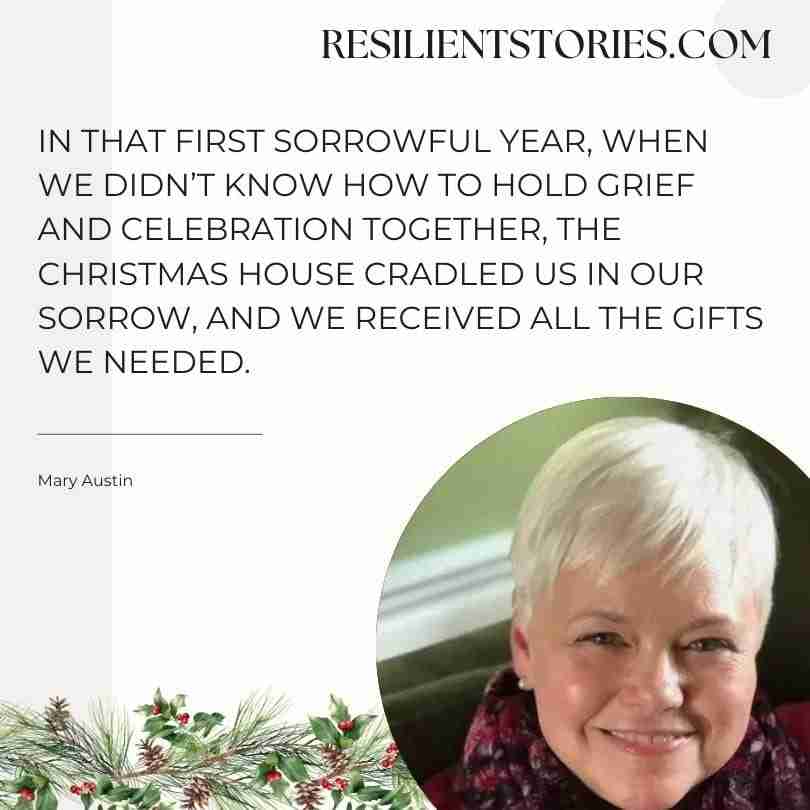
In that first sorrowful year, when we didn’t know how to hold grief and celebration together, the Christmas House cradled us in our sorrow, and we received all the gifts we needed.
Mary Austin, Personal writing at Stained Glass in the City
Helpful Tips for Managing Holiday Grief
Here are some strategies that can help you cope with grief during the holiday season.
Plan Ahead – Consider how you want to spend the holidays and communicate your needs with family members. Planning can help manage expectations and create a sense of control.
Take Care of Your Mental and Physical Health – Eating healthy, getting enough rest, and avoiding self-medication are crucial during this stressful time. Grief affects both the mind and body, so prioritizing self-care is essential.
Allow Yourself to Say ‘No’ – If certain holiday traditions feel overwhelming, give yourself permission to say no. It’s okay to take a step back from past holidays’ expectations.
Seek Support – Consider joining a grief support group or seeking professional help. Sharing your feelings with others who understand can provide a sense of community and lessen feelings of isolation.
Create New Traditions – Whether it’s lighting a candle, writing letters, or volunteering, new traditions can offer comfort and allow space for both sadness and celebration.
What to Say to Someone Grieving During the Holidays
When supporting someone experiencing grief during the holidays, it’s important to be empathetic and avoid platitudes.
Instead of saying, “Cheer up, it’s the holidays,” consider acknowledging their pain. Phrases like, “I’m thinking of you and [loved one’s name] during this time,” or “It’s okay to feel whatever you’re feeling,” can be more supportive.
Let them decide how much they want to engage in holiday activities and offer to listen without judgment.
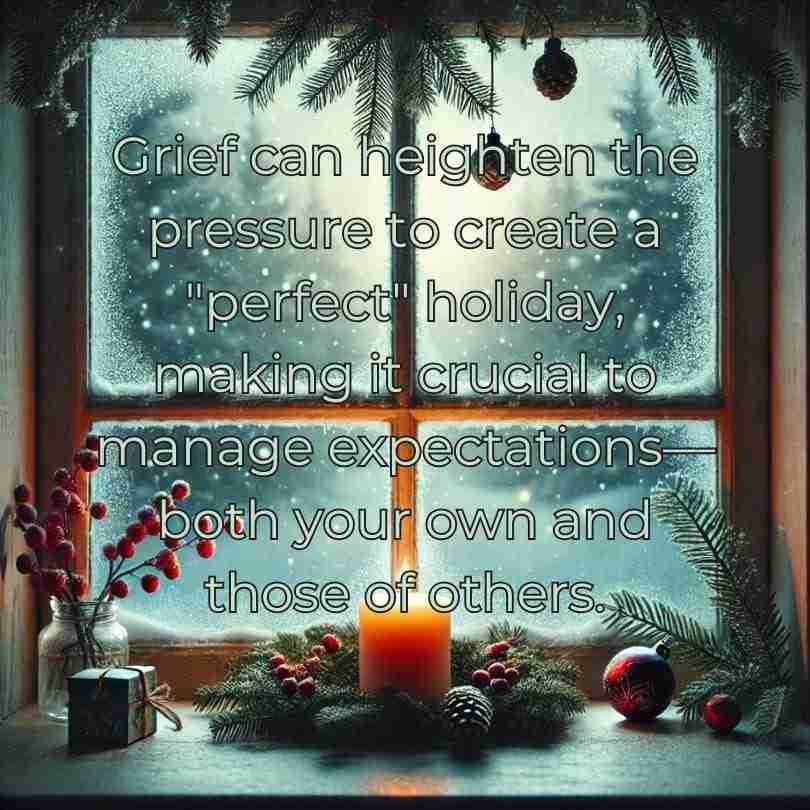
Managing Expectations During the Holiday Season
Grief can heighten the pressure to create a “perfect” holiday, making it crucial to manage expectations—both your own and those of others.
Recognizing that the holidays will likely be different after a loss can help set a more realistic emotional landscape. Allow yourself to decline invitations, change traditions, or embrace a quieter holiday without guilt.
It’s essential to understand that there’s no right or wrong way to grieve, and you have the freedom to decide how to engage in the season at your own pace.
For some, this might mean skipping certain events, like a holiday dinner, or simplifying typical holiday activities. For others, it might involve establishing boundaries with family members who may not understand the weight of your grief.
Communicating your needs and being honest about what you can handle are vital steps in maintaining your well-being.
Your holiday table might look much different this year. However, the fond memories you have of your loved ones will always be with you.
Do you have any helpful tips you would like to share? Please leave your thoughts in the comment section below.












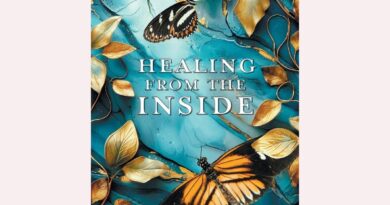












0 Comments